Future-proofing your EU funding strategy for the post-2027 period
Preparing for EU funding for the post-2027 period? Learn what organisations can do now to align with policy shifts, build partnerships and strengthen readiness.
Applying for EU funding can be a complex and challenging. Many applicants struggle, particularly those who are new to the process. The terminology, procedures and expectations can seem overwhelming at first, and it’s easy to make mistakes that jeopardise your chances of success. But with proper preparation and attention to detail, these challenges are entirely manageable.
This article offers 12 practical tips to help you avoid the most common stumbling blocks and improve the quality of your funding application.
Before drafting your application, ensure you are targeting the right programme – and the correct Call for Proposals. The EU offers a range of funding streams, each with its own objectives and priorities. Multiple Calls for Proposals may be open under a single programme at the same time, each outlining specific expectations for the projects the EU intends to support.
Read the Call text carefully, have a look at previously funded projects within that EU programme and funding strand, and make sure your goals align with the programme’s objectives.
For example, when you apply for Horizon Europe, your project really needs to have a clear focus on research and innovation. LIFE focuses on environmental and climate protection, not through new research but by testing, demonstrating and scaling up existing solutions.
Erasmus+ supports education, training, youth and sport, with a focus on mobility and skills development. CERV projects may also include some international exchanges, but their main aim is to promote rights, equality and civic participation, rather than learning or training.
To win grants for EU projects, applications need to be based on clear structures, logical progression and realistic planning. Define your goals, break them down into activities and set key milestones along a timeline.
Your planning should include a reasonable budget and timeline. Don’t overpromise just to appear ambitious. The experts reviewing your application prefer realistic and well-thought-out plans over big claims that don’t add up. Even the best project idea won’t succeed if it’s not presented clearly and consistently.
Most EU grants require or strongly encourage partnerships. Choosing the right partners is critical to the success of your proposal. Look for organisations that complement your expertise and bring added value. This could mean technical know-how, access to specific target groups, geographic coverage or strong policy connections. A balanced and well-structured consortium signals credibility to the evaluators.
If you are applying as a team or consortium, define who does what – both during the application process and in the actual project implementation.
While it’s usually the consortium coordinator’s role to spearhead the writing of the proposal, the partners will still need to contribute. Document roles early and make sure all partners are aligned on the goals and understand their responsibilities. Get to an agreement who has to provide what when, and how.
One of the most underestimated stumbling blocks in EU proposal writing is poor communication within your team or between partners. This can lead to mismatched inputs, conflicting messages and last-minute stress that weakens the proposal overall.
Establishing clear, regular communication channels, deadlines and a unified understanding of the project’s goals can prevent misunderstandings and ensure a consistent, coherent application.
Strong internal coordination is what turns good content into a competitive, fundable proposal.
It’s tempting to include everything you know into your application, but too much detail won’t help your case. Be specific, clear and concise. Show, don’t tell: instead of saying your project is innovative, explain how and why it is.
Avoid jargon or overly technical language unless it’s absolutely necessary. Ensure your proposal is easy for the evaluators to follow and understand the value of your project.
This may sound obvious, but it’s worth emphasising: follow the instructions. Read the application guide from start to finish. Make sure you use the correct templates, respect word limits and submit the required documents.
Missing or incorrect attachments or unchecked boxes can disqualify your application before anyone even reads the content.
A well-balanced budget underlines your project’s feasibility. Evaluators will look for coherence between your budget and planned activities. Each cost item should be justifiable and clearly linked to your project’s objectives.
Don’t inflate numbers, and at the same time don’t under-budget key activities. Aim for a balanced, realistic approach that reflects the scale of your project.
Every EU funding programme has its own evaluation criteria. These are usually published either in the programme’s annual work programme or in a detailed Call for Proposals document, both available on the EU Funding & Tenders Portal.
Go through the criteria one by one and ensure your application addresses each one clearly. Use the language and key words evaluators expect to see.
The EU aims to invest in projects that create lasting value, not just short-term outputs. Your application should explain how your project will sustain results beyond the funding. Show how your work aligns with EU values and priorities in the policy field of your project’s topic.
Think about the bigger picture: Will your project improve existing practices? Will it lead to policy change, new jobs, reduced emissions or better digital infrastructure?
It’s easy to underestimate the time it takes to prepare an application, especially when multiple partners or complex technicalities are involved. Therefore, start early, set internal deadlines, and foresee time for multiple review rounds.
Uploading the final version only on the deadline day is risky as there could be technical issues or unexpected errors – even from the side of the EU portal. Unfortunately this has happened multiple times in the recent past. Aim to submit your application at least a day (better 2 days) in advance.
Proposals grow through qualified contributions. Seek feedback from colleagues, external experts or professional advisors who have experience with EU projects. They can spot gaps, improve clarity and ensure compliance with programme expectations.
Their fresh perspective can turn a good application into a great one, and help you avoid costly mistakes that are hard to see when you are deep in the process.
Successfully applying for EU funding takes diligence, careful planning and a clear understanding of the requirements. With the right preparation, a realistic roadmap and insight into what evaluators expect, securing funding becomes entirely achievable. Begin with these 12 tips to avoid common pitfalls and strengthen your proposal from the outset.
The EU wants to fund impactful projects that make a difference, and yours could be one of them. Don’t hesitate to seek guidance along the way. Funding opportunities exist, and with the right approach your organisation can access them.
Would you like to learn more about how to get started with EU funding in a compact online starter course – with live Q&A? Check out “Kickstart Your EU Funding Journey – How to Find & Apply for EU Calls for Proposals”.
You don’t want to miss any new blog articles? Sign up for the EU Funding News & Tips.
—
Ready to take the next step? Discover the compact online course “Kickstart Your EU Funding Journey – Get Ready to Access EU Project Funding”

Author: Astrid Mechel
https://eufundingconsulting.eu
Hello, I am Astrid Mechel and I work (for the most part) with small and medium sized organisations who aim to access EU funding. It is my goal to help discovering suitable EU project funding possibilities and to provide support to submit a high-quality grant application. My main thematic focus is on grants for research and innovation, environmental sustainability as well as on social inclusion and participation.
Read more articles here:

Preparing for EU funding for the post-2027 period? Learn what organisations can do now to align with policy shifts, build partnerships and strengthen readiness.

EU project funding for nonprofits: Discover 6 misconceptions that hold organisations back and how to turn them into opportunities for growth and impact.

Winning Horizon Europe funding takes more than a great idea – it requires strategy, clear messaging, and a good understanding how proposals are evaluated.
Online Workshop
Interactive Live Workshop
On 22 May 2025 from 13h00-15h30
Registrations are closing soon
Curious about EU funding and how it could support your next project? Join the new live programme round for a compact and easy-to-follow way to get started with EU funding.
Key Terminologies – Application Guidance
This guidance compares and compare and clarifies the 10 key terminologies within an EU funding application. How should you address them in your proposal, and what kind of information belongs to which one of them?
Online Workshop on 6 November!
The workshop “Getting Started with EU Funding” is for participants with no or very limited experience in EU funding. Discover what kind of projects the EU is funding, the requirements and how you can apply for funding in your thematic field.
EU Funding Checklist

Do you have a new project idea and are wondering if EU funding could be available for your project?
This checklist will guide you through the most important questions to be considered when applying for EU project grants and includes some further suggestions how you could adapt your concept to be more in line with EU expectations regarding fundability.
Get the brand new upgraded guidance booklet (free offer):
Your compact guide on how they work and how your organisation can apply for funding
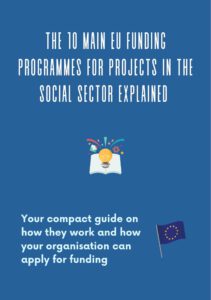
Find out which 10 EU programmes offer grants for projects in the social sector, what the conditions for funding are and how you can apply.
Online Workshop
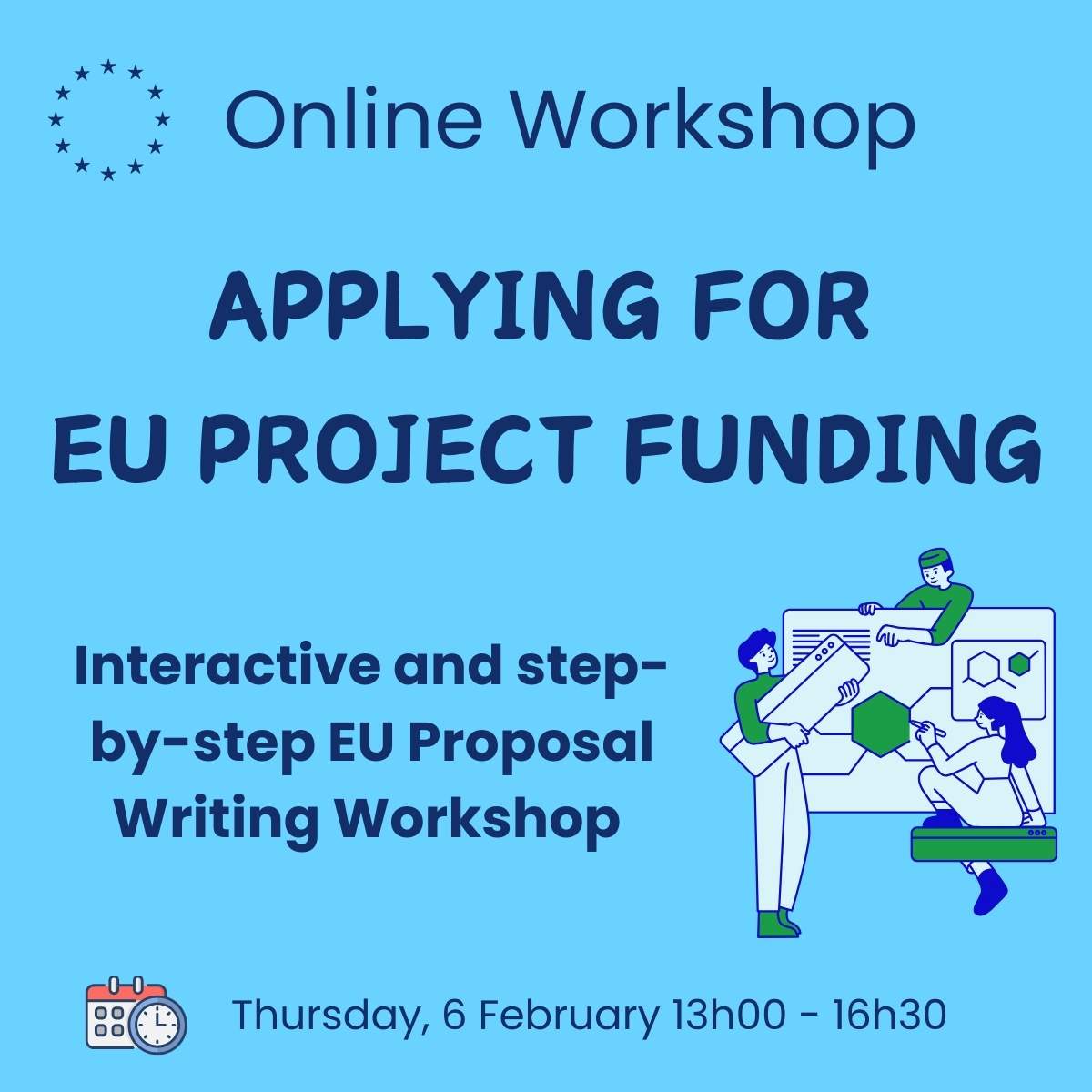
Interactive and step-by-step EU Proposal Writing Workshop
On 6 February 2025 from 13h00-16h30